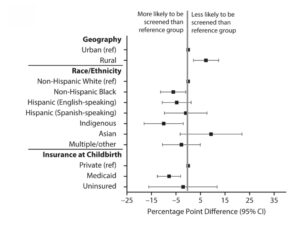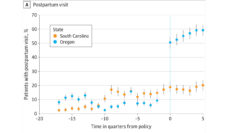Nearly half of American women have experienced intimate partner violence – the physical, emotional, and sexual abuse inflicted by a past or current intimate partner. Pregnant women are at particularly high risk of experiencing violence at the hands of their partner.
Intimate partner violence is the primary cause of maternal injury or death that is not clinical – for instance, related to severe bleeding or infection. The COVID-19 pandemic has substantially increased gender-based violence.
To reduce poor health outcomes for women survivors, screenings at health care visits are recommended by the American Academy of Family Physicians for all people of reproductive age. Providers ask women questions to assess if emotional and physical abuse is occurring and its frequency, if applicable. Assessments are especially important during pregnancy.
Katy B. Kozhimannil and colleagues used the 2016-2019 Pregnancy Risk Assessment Monitoring System, which collects data on 81% of all live births in the United States, to assess rates of intimate partner violence before, during, and after pregnancy. Overall, they found that 3.5% of women reported experiencing such violence.
The research team asked women if they attended a health care visit during their pregnancy and if (during the visit) a health care worker asked if someone was hurting them emotionally or physically. More than a quarter of those assaulted (26.9%) reported that they did not.

The figure above shows how likely a woman experiencing abuse is to receive a screening at health care appointments during their pregnancy, and the influence of personal characteristics. The authors conclude that Non-Hispanic White respondents, rural residents, and those with private insurance were less likely to be screened at health care visits compared to other groups.
Clinicians who disregard screenings of certain groups at appointments may have biases about who is at risk for interpersonal violence. In many instances, women of color are perceived to be at greater risk than others. The researchers argue for the integration of broader screening protocols in routine care, especially during pregnancy, to combat clinician misjudgments about who is at risk.
Databyte via Katy B. Kozhimannil, Valerie A. Lewis, Julia D. Interrante, et al. Screening for and Experiences of Intimate Partner Violence in the United States Before, During, and After Pregnancy, 2016–2019. American Journal of Public Health, 2023.
Photo via Getty Images














